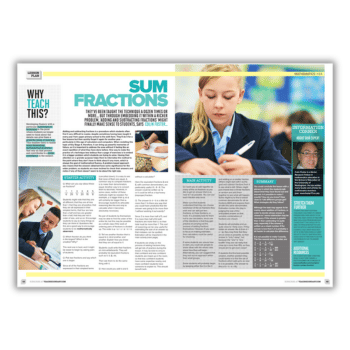Your pupils may have been taught the process of adding and subtracting fractions a dozen times or more already. However, through embedding it within a richer problem it might finally make sense…
Adding and subtracting fractions is a procedure which students often find very difficult to master. This is despite sometimes having been taught it every year from upper primary school to the sixth form.
They’ll do it for a few lessons but then quickly forget it again for another year. This is particularly true in this age of calculators and computers.
When revisiting this topic at Key Stage 4 it can bring up powerful memories of failure. Therefore it’s really important to address the area without it feeling like an exact repetition of what they have done before.
One way to make the practice of a technique less tedious than a page of exercises is to embed it in a bigger problem which students are trying to solve.
Having their attention on a grander purpose helps them to internalise the method. They get to the point where they don’t have to think about it any more, which is always the goal of mathematical fluency.
A problem-based approach also means that the answers obtained have some significance for the wider problem, so students are more inclined to check their answers and notice if any of them doesn’t seem to be about the right size.
Why teach this lesson?
Developing fluency with a particular mathematical technique to the point where students no longer need to think about the details can give them a powerful sense of mastery.
This enables them to tackle more demanding mathematical problems that rely on that process and contributes to a wider confidence in the subject.
Colin Foster is an assistant professor in mathematics education in the School of Education at the University of Nottingham. He has written many books and articles for maths teachers. Browse KS3 maths games and maths lessons.














